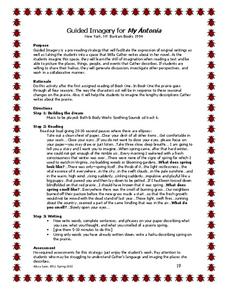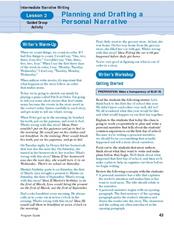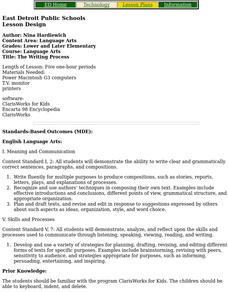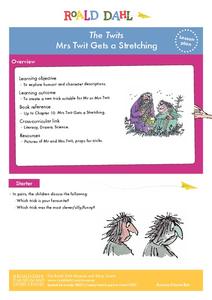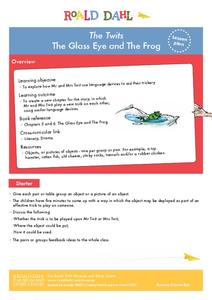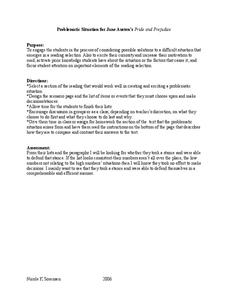Brigham Young University
Rosencrantz and Guildenstern Are Dead: Fishbowl Discussion
After reading through Act II of Rosencrantz and Guildenstern Are Dead, take some time to discuss the references to death in the play. For this fishbowl discussion, learners prepare questions, practice answering individually and with...
EngageNY
Grade 9 ELA Module 1: Unit 3, Lesson 18
Why is Romeo and Juliet considered a tragedy? Class members conclude their reading of the play, focusing on the final lines of Act 5, scene 3. They also consider how Shakespeare structures the text, orders events, and manipulates time to...
Curated OER
The Sound of…Poetry!
Scritch, scratch, scritch. It's the sound of pupils writing poetry! Focus on sensory language and onomatopoeia with a writing lesson. After listening to some sounds, learners examine a couple of poems that include sound words and then...
Curated OER
Whale Song Acrostic
What do whales sing about? Invite your class to imagine the thoughts of whales before writing acrostic poems on the topic. The plan blends together a bit of life science with plenty of opportunities for creativity and writing.
Curated OER
ESL English Grammar Lesson: The Royal Wedding
Have your ESL learners practice their written and oral English grammar skills, with this highly engaging ESL Lesson. Budding grammarians mingle across the room discovering what they each know about the Royal Wedding between Kate and...
Curated OER
My Antonia: Guided Imagery
Willa Cather's novel My Antonia is full of vivid imagery. Encourage your pupils to visualize and translate images from the text into original writing with this guided imagery activity. Learners listen to an excerpt, take a moment to...
EngageNY
Grade 9 ELA Module 2, Unit 2, Lesson 10
The slow curse of realization begins to sink in during the tenth lesson in a literary analysis unit on Sophocles' Oedipus the King. Ninth graders carefully read the selected lines for evidence of Oedipus' feelings during a turning point...
Roald Dahl
Matilda - Throwing the Hammer
Full truth, or an exaggeration? How can you tell when a storyteller is exaggerating a story? Readers analyze a story told by Hortensia, and identify the exaggerative language she uses. Then, learners write their own narrative story using...
Curated OER
Planning and Drafting a Personal Narrative
Bring your learners together to write a class narrative about the first day of school. Start off by teaching them about sequence with a quick oral activity. Then, work together to fill out a story map. Finally, compose the class...
Curated OER
Letter Writing: An English Language Arts Lesson For Writing/Proofreading
Ninth graders write a letter to someone who is deserving of thanks. Peer and self-editing takes place. After the writing process is completed and a copy is made for the portfolio, envelopes are distributed, addressed, sealed, and mailed.
Curated OER
Play: It's Not Just For Kids
Students realize that play is an important part of life and in the effort to staying healthy. They explore the role of play in society. In addition, they illustrate listening and speaking strategies for different purposes that pertain to...
Curated OER
The Writing Process
Show your young researchers how to find information, brainstorm a topic, map or outline their own stories, and create rough drafts. This lesson also shows learners how to peer edit, conference with the teacher, and write their final...
PBS
Supernatural Shakespeare and Macbeth
"A drum, a drum! Macbeth doth come." The withered and wild witches of Shakespeare’s Scottish play launch an examination of the fantastical elements in Act I, scene iii, paying particular attention to the action, imagery,...
Shakespeare Uncovered
Suits of Woe: Grief and Loss in Hamlet
“Thou know’st ‘tis common; all that lives must die/Passing through nature to eternity.” Grief, and the response to grief and loss, is the focus of a series of activities that uses Hamlet as a launchpad. Groups examine Act I, scene ii to...
Roald Dahl
The Twits - Mrs Twit Gets a Stretching
A cork, a rubber snake, and a bucket of mud may not seem like the best materials for washing a car, but they are in The Twits. The fifth lesson in an 11-part unit designed to accompany The Twits by Roald Dahl has readers role play...
Star Wars in the Classroom
"Shakespeare and Star Wars": Lesson Plan Day 15
To conclude the study of the play, William Shakespeare's Star Wars: Verily, A New Hope, class members craft an in-class essay comparing Doescher's adaptation to George Lucas's film, Star Wars: A New Hope.
Roald Dahl
The Twits - The Glass Eye and the Frog
What do a pair of stinky socks and a toy hamster have in common? The third lesson in an 11-part unit designed to accompany The Twits by Roald Dahl uses silly objects to teach about figurative language. Zany pranks and role play make...
Curated OER
Write a Short Story
Students compare two paintings, depicting urban life in America in the 1940's, answering a series of questions, then create a short story about the paintings' characters. They compare 'Nighthawks' and 'Nightlife.'
Curated OER
Pride and Prejudice: Problematic Situation
What would you do if your sister ran off with a man whom you didn't trust? Explore a scenario based on Jane Austen's Pride and Prejudice. Once kids work though the problem, they read the appropriate chapters from the book and write...
Curated OER
Online —On Stage—and Action
Use your tablets to participate in a culture-sharing project with a class in a foreign country. Your class can communicate and share ideas with a class in another country, swapping information regarding language and culture. Together you...
Star Wars in the Classroom
"Shakespeare and Star Wars": Lesson Plan Day 3
To make the point that there are many forms of language, each with its own purpose, class members select 10 lines from Doescher's play, translate these lines first into contemporary English and then into "SMS/Tweet."
Curated OER
Lesson Learned: Creating a Life Reports Project
Tap into the wisdom and knowledge of older members of the community with this New York Times plan. To warm up, learners write about and discuss advice they have been given. After reading "The Life Report," an op-ed column that asks older...
Curated OER
Monsters
Do monsters really exist? Find out what your class thinks with these discussion questions prior to reading Beowulf. Incorporate music and a video clip into the anticipatory set to engage your learners. Take a day to search online...
Curated OER
Spanish in English
What do the words alligator, armadillo, and cockroach all have in common? Each one is an English word with Spanish origins. Introduce young etymologists to the joys of discovering word origins with a lesson that asks them to create a...





